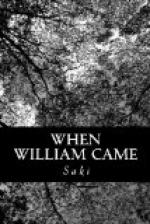His companion laughed cynically.
“As if you hadn’t read everything that the Dawn and the other morning papers have to say about the ball hours ago.”
“The naked truth should be avoided in a Turkish bath,” said Cornelian; “kindly assume that I’ve only had time to glance at the weather forecast and the news from China.”
“Oh, very well,” said the other; “your costume isn’t described; you simply come amid a host of others as ’Mr. Cornelian Valpy, resplendent as the Emperor Nero; with him Miss Kate Lerra, typifying Insensate Vanity.’ Many hard things have been said of Nero, but his unkindest critics have never accused him of resembling you in feature. Until some very clear evidence is produced I shall refuse to believe it.”
Cornelian was proof against these shafts; leaning back gracefully in his chair he launched forth into that detailed description of his last night’s attire which the Dawn had so unaccountably failed to supply.
“I wore a tunic of white Nepaulese silk, with a collar of pearls, real pearls. Round my waist I had a girdle of twisted serpents in beaten gold, studded all over with amethysts. My sandals were of gold, laced with scarlet thread, and I had seven bracelets of gold on each arm. Round my head I had a wreath of golden laurel leaves set with scarlet berries, and hanging over my left shoulder was a silk robe of mulberry purple, broidered with the signs of the zodiac in gold and scarlet; I had it made specially for the occasion. At my side I had an ivory-sheathed dagger, with a green jade handle, hung in a green Cordova leather—”
At this point of the recital his companion rose softly, flung his cigarette end into the little water-bowl, and passed into the further swelter room. Cornelian Valpy was left, still clothed in a look of ineffable complacency, still engaged, in all probability, in reclothing himself in the finery of the previous evening.
CHAPTER XVIII: THE DEAD WHO DO NOT UNDERSTAND
The pale light of a November afternoon faded rapidly into the dusk of a November evening. Far over the countryside housewives put up their cottage shutters, lit their lamps, and made the customary remark that the days were drawing in. In barn yards and poultry-runs the greediest pullets made a final tour of inspection, picking up the stray remaining morsels of the evening meal, and then, with much scrambling and squawking, sought the places on the roosting-pole that they thought should belong to them. Labourers working in yard and field began to turn their thoughts homeward or tavernward as the case might be. And through the cold squelching slush of a water-logged meadow a weary, bedraggled, but unbeaten fox stiffly picked his way, climbed a high bramble-grown bank, and flung himself into the sheltering labyrinth of a stretching tangle of woods. The pack of fierce-mouthed things that had rattled him from copse and gorse-cover,




